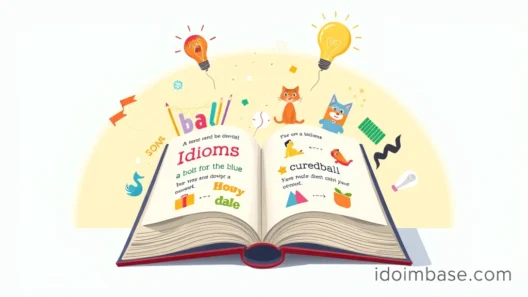Hey there, lucky charm! Have you ever wondered why some days just seem to sparkle with extra magic, bringing unexpected joy and opportunities your way? It’s almost as if the universe winks at you, doesn't it? We all yearn for those moments when everything just clicks, when fortune smiles upon us, and dreams feel within reach. That feeling, dear reader, is what we often call "good luck."
But what exactly is good luck, and how do we talk about it? Well, English is brimming with colorful expressions that capture this very essence. From ancient superstitions to modern-day metaphors, our language offers a treasure trove of idioms that describe those fortunate twists of fate. Get ready to dive into a delightful collection of 35 idioms about good luck that will not only expand your vocabulary but also add a touch of sparkle to your conversations!
35 Idioms About Good Luck
Let's explore these wonderful expressions that celebrate serendipity and fortunate events. You'll be amazed at how many ways there are to say "good luck"!
Common Expressions of Fortune
These are some of the most frequently used idioms you'll hear when good fortune strikes.
-
A Stroke of Luck: Imagine a sudden, unexpected moment where everything just goes your way. That's a stroke of luck! It implies a singular, significant fortunate event.
- Example: "Finding that rare vintage comic book at a garage sale was a real stroke of luck!"
-
To Be Born Under a Lucky Star: This idiom suggests someone is inherently fortunate, as if their destiny was pre-ordained for good things. It’s a lovely way to describe someone who seems to always have good things happen to them.
- Example: "She always wins raffles; I swear she was born under a lucky star."
-
To Have the Luck of the Irish: Despite some historical hardships, this phrase affectionately implies exceptional, often surprising, good fortune.
- Example: "He lost his wallet but found it full of cash later – he truly has the luck of the Irish!"
-
To Be in Luck: A simple and direct way to say that circumstances are currently favorable for someone.
- Example: "You're in luck! We still have one slice of that delicious chocolate cake left."
-
To Strike It Lucky: This means to suddenly experience a period of good fortune, often involving a significant gain or success.
- Example: "After years of trying, he finally struck it lucky with his lottery ticket."
-
To Get a Lucky Break: This refers to an unexpected opportunity or piece of good fortune that helps you achieve success, especially in a career or difficult situation.
- Example: "Landing that internship was a huge lucky break for her career."
-
Lady Luck Smiles (or Favors): Personifying luck as a benevolent woman who bestows favor upon someone. It suggests a moment of divine or fated assistance.
- Example: "Lady Luck smiled on us when we found a parking spot right in front of the venue."
-
To Break the Bank: While often used negatively (to spend all your money), it can also imply winning so much money that you "break" the casino's bank. In this context, it signifies immense good fortune.
- Example: "He played the slot machine for hours and finally broke the bank with the jackpot!"
-
To Hit the Jackpot: Directly from gambling, this means to achieve a great success or gain a large amount of money or something highly desirable.
- Example: "Finding a job that perfectly matches my skills and passions feels like hitting the jackpot."
-
To Have Beginner's Luck: This idiom describes the phenomenon where someone new to an activity experiences immediate success, often unexpectedly.
- Example: "I'd never played poker before, but I won the first round – must be beginner's luck!"
Idioms About Unexpected Good Fortune
Sometimes good luck just sneaks up on you!
-
To Fall on Your Feet: This means to recover quickly from a difficult situation and end up in a good position, often through good fortune.
- Example: "Despite losing his job, he quickly fell on his feet with an even better offer."
-
To Get Off Scot-Free: To escape punishment or difficulty without any negative consequences, often due to good luck.
- Example: "The police couldn't find enough evidence, so he got off scot-free."
-
To Get Away With Murder: Similar to "scot-free," this means to succeed in doing something wrong or risky without being caught or punished, often implying an element of luck.
- Example: "He constantly breaks the rules, but somehow he always gets away with murder."

-
To Fall into Someone's Lap: When something desirable or beneficial comes to you effortlessly, without any effort on your part.
- Example: "The perfect job just fell into my lap when my old colleague recommended me."
-
To Land on Your Feet: Another way of saying "to fall on your feet," emphasizing resilience and good fortune in adverse circumstances.
- Example: "No matter what challenges she faces, she always manages to land on her feet."
-
To Turn Out for the Best: When a seemingly bad situation ultimately results in a positive outcome, often thanks to unforeseen factors or good luck.
- Example: "Losing that flight seemed terrible at the time, but it turned out for the best because I avoided a big storm."
-
To Have All the Cards: To be in a very strong or advantageous position, implying that luck or circumstances have aligned in your favor.
- Example: "With his experience and connections, he has all the cards for this promotion."
Idioms Suggesting Positive Outcomes
These idioms describe situations where things just work out beautifully.
-
To Be a Godsend: Something or someone that comes at a time of great need and provides much-needed help or relief, often seen as a fortunate intervention.
- Example: "That unexpected bonus was a godsend during our financial struggles."
-
To Be a Blessing in Disguise: An apparent misfortune that ultimately has a positive outcome or benefit.
- Example: "Getting fired was a blessing in disguise; it pushed me to start my own successful business."
-
To Hit Pay Dirt: To find something valuable or achieve great success, often after much effort, like striking gold.
- Example: "After months of research, they finally hit pay dirt with their new invention."
-
To Fall into Place: When various elements of a situation organize themselves perfectly, leading to a smooth and successful outcome.
- Example: "Once we found the right venue, all the other wedding plans just fell into place."
-
To Have the Wind at Your Back: To have favorable conditions or support that propel you forward, making progress easier.
- Example: "With the new funding, the startup truly has the wind at its back."

-
To Be on a Roll: To experience a continuous period of success or good fortune.
- Example: "Our team has won five games in a row; we're really on a roll!"
-
To Come Up Roses: When a situation that seemed difficult or unpleasant ultimately turns out well.
- Example: "Despite all the challenges, the project came up roses in the end."
-
To Have a Run of Good Luck: A continuous period during which fortunate events occur.
- Example: "Ever since she got that promotion, she's been having a run of good luck."
Idioms Related to Chance and Opportunity
Luck often intertwines with seizing the right moment.
-
To Catch a Break: To get an opportunity or a fortunate turn of events, especially after facing difficulties.
- Example: "After years of struggling, he finally caught a break in the music industry."
-
To Get the Green Light: To receive permission to proceed with something, often implying that all obstacles have been removed by good fortune or approval.
- Example: "The project got the green light from the investors this morning!"
-
To Have the Cards Stacked in Your Favor: To be in a situation where success is highly probable due to advantageous circumstances.
- Example: "With her perfect qualifications and insider knowledge, she had the cards stacked in her favor for the job."
-
To Be in the Right Place at the Right Time: To experience good fortune simply by being present where an opportunity or positive event occurs.
- Example: "He got that acting role just by being in the right place at the right time when the director was scouting."
-
To Have an Ace Up Your Sleeve: To possess a secret advantage or piece of information that can be used when needed, often implying a strategic form of good luck.
- Example: "Don't worry, I have an ace up my sleeve for this negotiation."
Whimsical and Less Common Idioms

These add a bit more flavor to your expressions of good fortune.
-
To Get a Leg Up: To gain an advantage over others, often through a fortunate circumstance or help.
- Example: "Her uncle's connections gave her a leg up in the competitive industry."
-
To Get a Piece of the Action: To participate in something profitable or exciting, often implying good fortune in being included.
- Example: "Everyone wants to get a piece of the action now that the company is thriving."
-
To Be on Cloud Nine: While not directly about luck, it describes a state of extreme happiness, often a result of good fortune or a positive turn of events.
- Example: "After winning the championship, the team was on cloud nine for weeks."
-
To Be in Clover: To be living in luxury and prosperity, often implying that good fortune has brought about this comfortable state.
- Example: "Ever since her book became a bestseller, she's been in clover."
-
To Have a Golden Touch: To be exceptionally successful in everything you undertake, as if everything you touch turns to gold (like King Midas). This is the ultimate good luck!
- Example: "Every business idea he comes up with turns into a success; he truly has a golden touch."
Frequently Asked Questions (FAQ)
What is the most common idiom for good luck?
The most common and straightforward idiom for good luck is often "a stroke of luck" or simply "to be in luck." These phrases are widely understood and used in everyday conversation to describe fortunate events.
How can I use these idioms in my daily conversations?
The best way to use these idioms is to listen for opportunities where they naturally fit. For example, if someone shares a fortunate event, you can say, "Wow, that was a real stroke of luck!" or "You were definitely in the right place at the right time!" Practicing them in context will make them feel more natural.
Are there any idioms that mean the opposite of good luck?
Absolutely! While this article focuses on good luck, there are many idioms for bad luck, such as "down on your luck," "to have a run of bad luck," "to be snake-bitten," or "to be jinxed."
Do these idioms have historical origins?
Many idioms have fascinating historical origins! For instance, "to be born under a lucky star" comes from ancient astrological beliefs, while "to hit the jackpot" clearly originates from gambling. Understanding their roots can often add another layer of appreciation for the language.
Can using idioms improve my English fluency?
Yes, definitely! Using idioms shows a deeper understanding of the language and makes your speech sound more natural and fluent to native speakers. It also helps you understand nuances in conversations and media.
Are these idioms specific to American English or British English?
Most of the idioms listed are widely understood and used across different English-speaking regions, including American English, British English, Canadian English, and Australian English. There might be slight preferences for certain phrases in particular regions, but generally, they are universal.
Key Takeaways
- English is rich with diverse idioms to describe good luck, reflecting various aspects of fortune, from sudden windfalls to continuous periods of success.
- Understanding these idioms enhances your vocabulary and allows you to express nuances of good fortune more effectively.
- Using idioms makes your English sound more natural, fluent, and engaging.
- Many idioms have interesting historical or metaphorical origins, adding depth to their meaning.
- Practicing these idioms in context is key to incorporating them seamlessly into your daily conversations.
So, the next time something wonderful happens, you'll have a whole new set of phrases to describe that magical feeling. May your days be filled with strokes of luck, fortunate breaks, and moments where Lady Luck truly smiles upon you! Keep exploring, keep learning, and may you always have the wind at your back!





